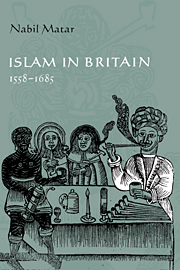Book contents
- Frontmatter
- Contents
- Acknowledgments
- Transcription
- Introduction: Islam in early modern Britain
- 1 “Turning Turke”: conversion to Islam in English writings
- 2 The renegade on stage and in church
- 3 “Arabia Britannica”: “Alcoran” and the legacy of Arabic Islam
- 4 “Baptizing the Turk”: conversion to Christianity in English writings
- 5 Eschatology and the Saracens
- Conclusion: Islam and Britain: centripetal to centrifugal
- Bibliography
- Index
4 - “Baptizing the Turk”: conversion to Christianity in English writings
Published online by Cambridge University Press: 27 October 2009
- Frontmatter
- Contents
- Acknowledgments
- Transcription
- Introduction: Islam in early modern Britain
- 1 “Turning Turke”: conversion to Islam in English writings
- 2 The renegade on stage and in church
- 3 “Arabia Britannica”: “Alcoran” and the legacy of Arabic Islam
- 4 “Baptizing the Turk”: conversion to Christianity in English writings
- 5 Eschatology and the Saracens
- Conclusion: Islam and Britain: centripetal to centrifugal
- Bibliography
- Index
Summary
Whether in the coffee-house or in the pages of The Christian Astrologer and Hai, early modern English society perceived an Islamic world that was powerful, culturally different and non-Christian. Although some Britons adopted customs, texts and ideas from the Muslims, others reacted with a pride that inspired poets and theologians to think of God as English and to see the nation as an “English Zion.” This pride sometimes extended to notions of religio-racial superiority as can be seen in the popular saying that one Protestant Englishman was worth three Catholic Portuguese, and one Portuguese was worth three Muslim Moors.
Such pride had informed the medieval romances against the Muslims. After Western Christians had lost the military encounter with the Muslims in the Holy Land, writers from France and England and elsewhere in Europe turned to defeat them in literature. In the romances and chansons de geste, Christians so overpowered the Muslims religiously that the latter were frequently portrayed as eager to convert in order to join the higher society of Christendom: indeed, “a converted Saracen giant and a defeated Sultan provided a happy dream of triumph when the Crusades were failing.” A similar sense of powerlessness against the military expansion of the Ottoman Empire occurred in the early modern period: unable to “dominate” the “Turks” – after all, Istanbul was the biggest city in Europe in the seventeenth century – English writers turned to the only option left for them in confronting Islam: to fantasize in drama and sermon about Christian victory and Muslim defeat.
One sphere in which English society particularly felt the need to defeat Islam was evangelization.
- Type
- Chapter
- Information
- Islam in Britain, 1558–1685 , pp. 120 - 152Publisher: Cambridge University PressPrint publication year: 1998



